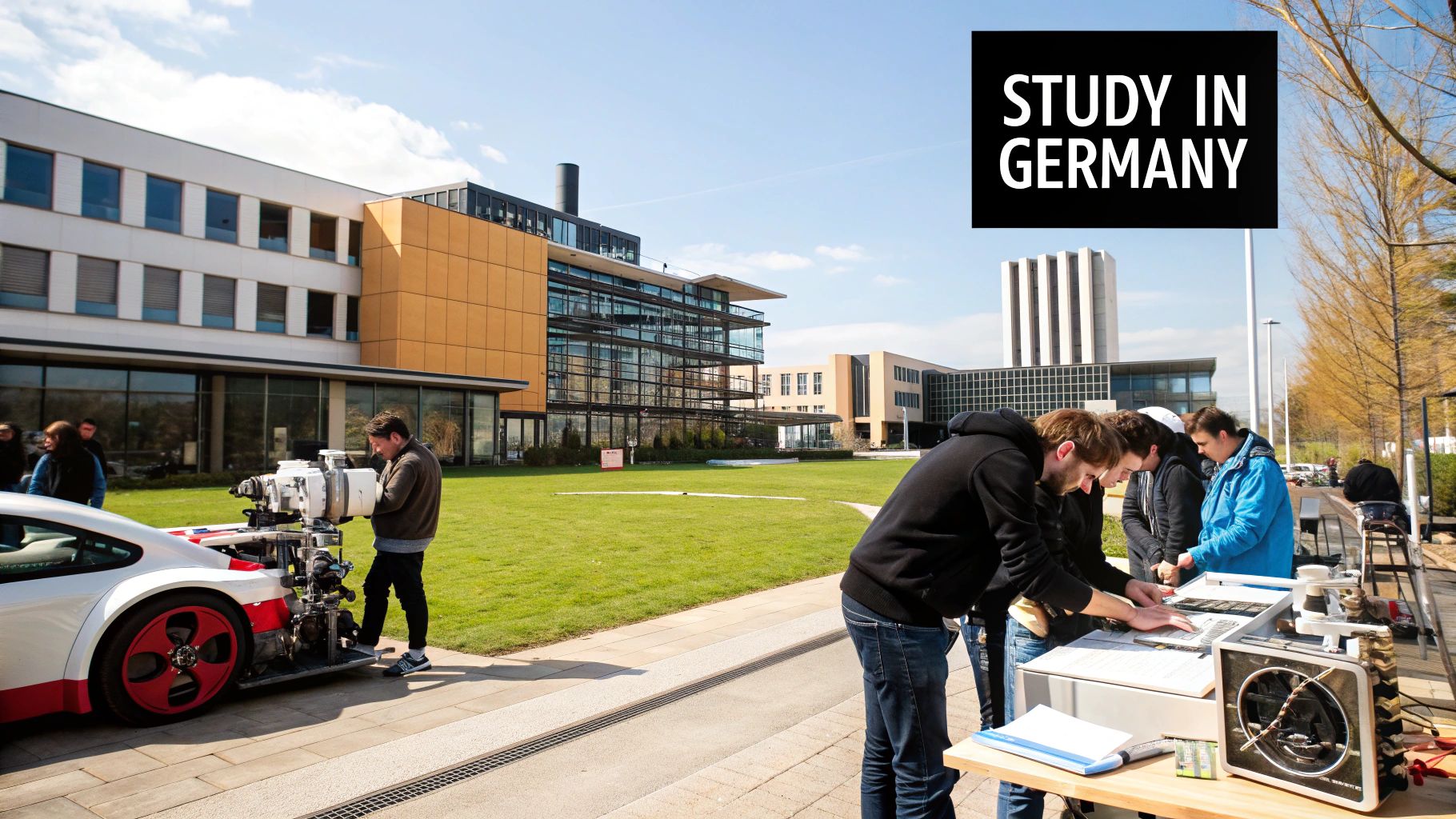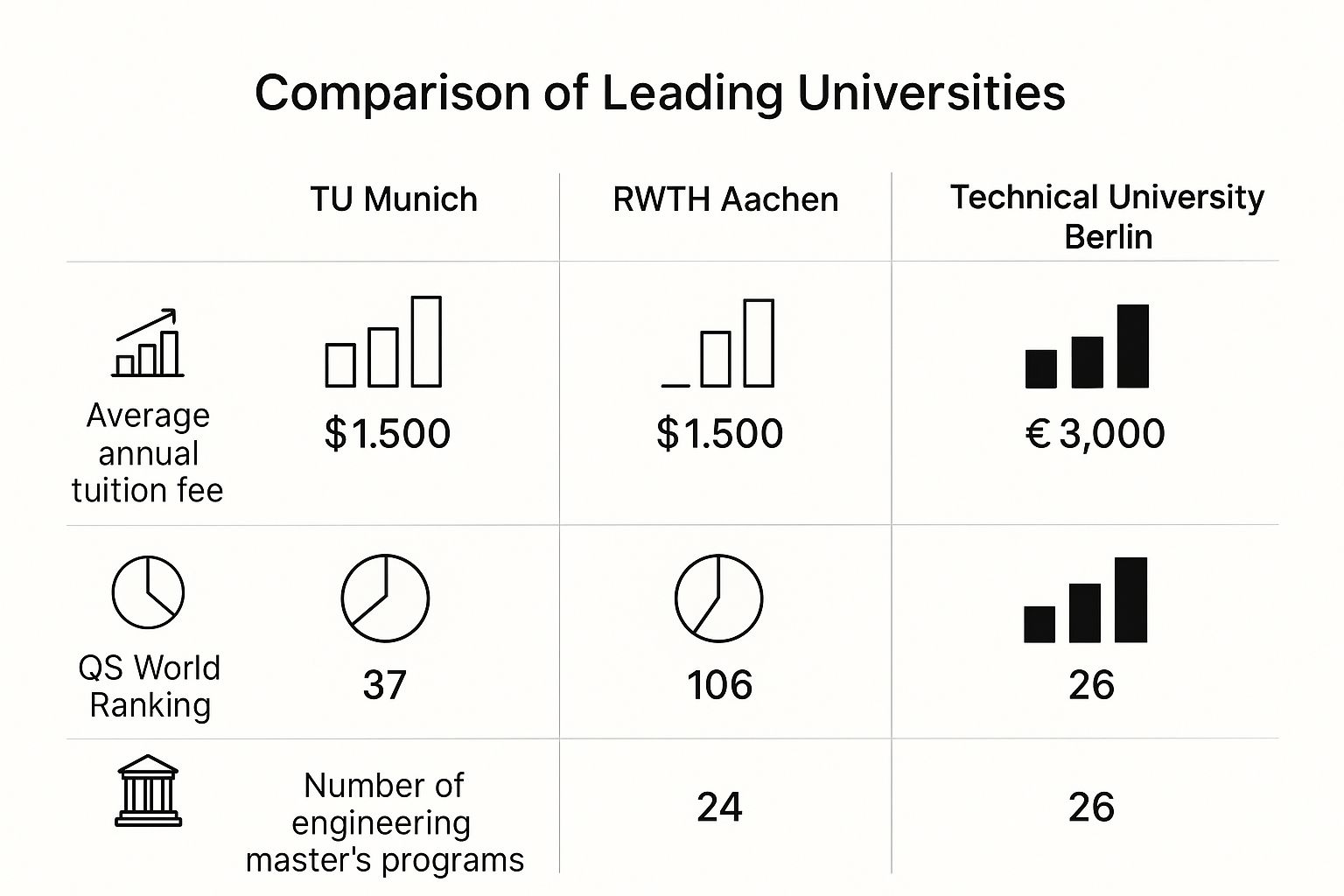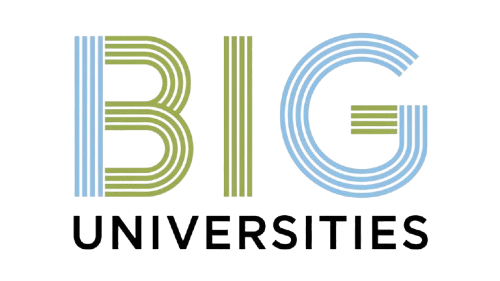Germany is a powerhouse when it comes to engineering, and it’s consistently a top choice for a master’s in engineering. The education here is world-class, public universities often have zero tuition fees, and the whole system is built on a solid foundation of academic theory linked directly to industry. It’s a clear path to a successful global career.
Why Germany Is a Top Choice for Your Engineering Masters
When you think of engineering excellence, Germany probably springs to mind. This isn't just some old reputation; it's a living, breathing reality powered by an education system that acts like a high-performance engine. The universities provide the raw theoretical horsepower, while close partnerships with giants like BMW, Siemens, and Bosch add the practical torque. It's a combination that gives graduates some serious career acceleration.

Choosing a masters in engineering Germany programme isn't just an academic box to tick; it’s a strategic career move. The country's deep commitment to research and development means you'll be learning at the sharp end of innovation, whether your passion is automotive engineering, renewable energy, or mechatronics.
The Unbeatable Combination of Quality and Affordability
One of the biggest draws for students flocking to Germany is its incredible value. Seriously, imagine getting a globally respected engineering degree without being weighed down by massive tuition fees. Most public universities in Germany only charge a small semester contribution, which covers administrative costs and often includes a public transport pass.
This affordability doesn't mean you're compromising on quality. Not at all. In fact, German institutions are consistently ranked among the world's best. You get access to cutting-edge facilities, renowned professors, and a curriculum that is both tough and totally relevant to what the industry needs right now. If you want to dive deeper into these leading institutions, have a look at our guide on the top universities in Germany.
A Direct Pathway to a Global Career
The German education system is built with your future job in mind. The strong connections between universities and industry open up tons of opportunities for internships, co-op programmes, and thesis collaborations. These aren't just lines to add to your CV; they're real-world training grounds where you get to apply all that theory to solve actual problems.
A German engineering degree is a seal of quality that’s recognised worldwide. It tells employers that you don't just have deep technical knowledge, but you also have the practical skills and problem-solving mindset to thrive in a competitive global market.
What's more, the country actively wants international talent to stick around and contribute to its economy. After you graduate, you're eligible for an 18-month post-study work visa. That gives you plenty of time to find a job in your field and kick-start your career in one of Europe's strongest economies.
This supportive environment is really built on four key pillars:
- World-Class Education: You get access to top-tier research and faculty.
- Strong Industry Links: This means practical experience with global engineering leaders.
- Post-Study Opportunities: A generous visa policy is there to help launch your career.
- High Standard of Living: You can expect excellent infrastructure, safety, and a rich cultural life.
Decoding the German University System for Engineers
Choosing the right university for your masters in engineering in Germany is a massive first step, and honestly, getting your head around the system is half the battle. The German higher education landscape isn't a one-size-fits-all deal. Instead, think of it like an engineer's toolkit, with different institutions designed for very specific jobs.
Your main choices will boil down to Technical Universities (TUs), Universities of Applied Sciences (Fachhochschulen), and private institutions. Each one offers a completely different vibe and leads to different career paths, so matching your choice to your own goals is absolutely key.
Technical Universities: The Hubs of Research and Theory
Technical Universities, or TUs as they're commonly known, are the precision instruments in this toolkit. These are the places deeply rooted in hardcore research and theoretical knowledge. If you're dreaming of pushing the boundaries of science, publishing papers, or even diving into a PhD after your master's, a TU is almost certainly where you belong.
The curriculum is intense and academically demanding, digging deep into the fundamental principles that make everything tick.
- Emphasis on Research: TUs are Germany's engine rooms for scientific research, often collaborating on huge international projects.
- Theoretical Depth: You'll be swimming in complex theories, mathematical models, and advanced scientific concepts. It’s brain food for future innovators.
- Path to Academia: They lay the perfect groundwork for a career in research or becoming a professor yourself one day.
This image breaks down some key stats for three of Germany's top TUs, giving you a snapshot of their global standing, the sheer number of programmes they offer, and what you can expect cost-wise.

As you can see, even though these are world-class institutions, they're incredibly affordable thanks to Germany's public education system. Pretty amazing, right?
Universities of Applied Sciences: The Bridge to Industry
If TUs are the precision instruments, then Universities of Applied Sciences, or Fachhochschulen (FH), are the powerful, practical tools built for getting the job done in the real world. These institutions are all about hands-on application and working directly with industry. Their whole purpose is to churn out graduates who can start solving real-world engineering challenges from day one.
The teaching style is super practical, often with mandatory internships, loads of project-based work, and professors who usually come from long, successful careers in the industry. To get a better feel for this hands-on approach, you can learn more about what German engineering studies really involve.
Fachhochschulen are designed to be a direct pipeline into the workforce. Their strong ties with local and national companies mean that curricula are constantly updated to reflect current industry needs and technological trends.
Private Universities: Niche Specialisations and Services
Finally, you've got private universities, which offer another distinct path. Yes, they come with a much bigger price tag, but in return, you often get smaller class sizes, highly specialised programmes you won't find anywhere else, and a ton of student support.
They tend to have strong international networks and might offer more flexible or accelerated programmes. These are a great fit if you're chasing a very specific curriculum or just thrive in a more personalised learning environment.
To make this a bit clearer, let's break down the key differences in a table. Choosing the right type of university really is the foundation of your journey to earning a masters in engineering in Germany.
Comparing German University Types for Engineering Students
| Factor | Technical Universities (TU) | Universities of Applied Sciences (Fachhochschule) | Private Universities |
|---|---|---|---|
| Primary Focus | Research, theory, and scientific principles. | Practical application, hands-on skills, and industry readiness. | Niche specialisations, personalised learning, and student services. |
| Best For | Students aiming for a PhD, research careers, or academia. | Students who want to enter the industry immediately after graduating. | Students seeking specific programmes or a high-support environment. |
| Teaching Style | Lecture-based, theoretical, with large class sizes. | Project-based, seminars, with mandatory internships and smaller classes. | Small class sizes, highly interactive, and strong student-faculty mentorship. |
| Faculty Background | Primarily academic researchers with PhDs. | Professionals with extensive industry experience. | A mix of academics and industry experts, often with international ties. |
| Industry Links | Research collaborations with major corporations. | Strong partnerships with local and national companies for internships and projects. | Close-knit networks, often with specific international or corporate partners. |
| Tuition Fees | Very low or no tuition fees at public universities. | Very low or no tuition fees at public institutions. | Significantly higher tuition fees. |
Ultimately, there's no single "best" option—it's all about what's best for you. A TU will set you up for a life in research, a Fachhochschule will make you incredibly employable straight out of the gate, and a private university can offer a unique, tailored experience. Consider your career goals, learning style, and budget, and the right choice will become much clearer.
Exploring Top Engineering Specializations in Germany
Germany's reputation for engineering isn't just talk; it’s built on a powerhouse industrial landscape. When you look into a masters in engineering in Germany, you're not just picking a subject. You're plugging directly into a sector where the country is a world leader. The specializations on offer are a perfect reflection of Germany's economic muscle, creating a clear line from your classroom to a career that matters.
This means you can chase a field you're genuinely passionate about, knowing it's backed by incredible research and huge industry demand. Think about it: from the roar of the automotive industry to the quiet hum of renewable energy systems, your master's degree is basically a launchpad into the heart of innovation.
The Titans: Mechanical and Automotive Engineering
You can't even begin to talk about German engineering without tipping your hat to its traditional strongholds: Mechanical and Automotive Engineering. These fields are the very foundation of the "Made in Germany" seal of quality and, unsurprisingly, remain incredibly popular choices for international students. A master's degree here is a deep dive into how machinery and vehicles are designed, built, and operated.
But don't think it's all old-school principles. Modern programmes are packed with cutting-edge topics like robotics, advanced materials, and sustainable manufacturing. Just imagine working on the next generation of electric vehicle batteries at a university partnered with BMW, or designing hyper-efficient production lines for a giant like Siemens. That’s the kind of real-world connection you get.
Take a look at the homepage for the Technical University of Munich (TUM), a global leader in engineering, and you'll see exactly what I mean.

Right away, the university shows its commitment to future-focused topics like sustainability and technology. These aren't just buzzwords; they're central themes woven throughout their engineering programmes.
The Innovators: Mechatronics and Environmental Engineering
While Germany respects its industrial history, it's absolutely obsessed with the future. This forward-thinking vibe is perfectly captured in specializations like Mechatronics and Environmental Engineering. These are the fields where Germany’s innovative spirit really flexes its muscles, tackling some of the biggest challenges on the planet.
Mechatronics is a brilliant example of this mix-and-match approach. It’s not just mechanical or electrical engineering; it's the smart fusion of both, with a heavy dose of computer science. Think of it as giving modern technology its brain and nervous system.
- Mechatronics: This specialization gets you ready to design and build smart systems—everything from advanced factory robots to the complex control systems in self-driving cars.
- Environmental Engineering: With Germany's massive push towards sustainability (the famous Energiewende), this field is absolutely booming. You'll be working on renewable energy solutions, smart waste management, and the tech behind a circular economy.
Choosing a specialization like Environmental Engineering in Germany means you're not just getting a degree. You're becoming part of a national mission to build a sustainable future, backed by serious government and industry money.
A Spectrum of High-Demand Fields
Of course, the options go way beyond just these few examples, showing just how diverse the country's industrial needs are. German master's programmes are known for offering fantastic multidisciplinary options and specialized tracks built for today's tech demands. Key disciplines like Materials Science, Electrical Engineering, and Systems Engineering are all tailored to specific industry priorities. You can find out more about the variety of engineering programmes in Germany and how they line up with the country's focus on innovation.
So, whether you're fascinated by the microscopic world of materials science or the massive, interconnected networks of systems engineering, you'll find a programme that fits. This variety ensures that your masters in engineering Germany journey is more than just an education—it's a strategic move toward a career you'll love, in a field that needs you.
Your Step-by-Step Guide to the Admission Process
Applying for a Master's in Engineering in Germany can feel a bit like trying to assemble a complex piece of German machinery without the instruction manual. It seems daunting, but once you break it down, it's a series of clear, manageable steps. Think of it as your project plan, with each completed task getting you closer to your goal.
The first thing you need to get your head around is that German universities are all about precision and being thorough. Your application is your first chance to show you've got those qualities. From ticking off the academic boxes to proving you can handle the language, every single detail matters. Let's walk through the whole process, step by step.
Understanding the Core Academic Requirements
Before you even dream of filling out an application form, you need to be sure you meet the basic academic standards. German universities are really specific about this, and it’s not just about having a bachelor’s degree in the right field. They zoom in on two key things: your Grade Point Average (GPA) and your ECTS credits.
- GPA (Grade Point Average): While it varies from uni to uni, most competitive engineering programmes are looking for a GPA of at least 2.5 on the German scale. Remember, their scale is flipped, with 1.0 being the best and 4.0 being the lowest passing grade. This means you need a pretty strong academic record in the Indian system to be in the running.
- ECTS Credits: This is the European Credit Transfer and Accumulation System, a standard used all over Europe. You’ll have to show that your undergraduate degree covered enough credits in the real foundational stuff—think mathematics, physics, and core engineering subjects.
If you don't meet these baseline requirements, it’s often an automatic rejection. So, it's super important to check the specific course page for every single university you're interested in.
Proving Your Language Proficiency
This one's a no-brainer. You have to be able to understand lectures, jump into discussions, and write academic papers. It's non-negotiable. Depending on whether your chosen master's is taught in English or German, you'll need to show official proof of your skills.
For English-taught programmes, these are the usual suspects:
- IELTS: A minimum overall score of 6.5 is the typical benchmark.
- TOEFL: You'll usually need a score of around 90 on the internet-based test (iBT).
If you're aiming for a German-taught programme, you’ll need to prove you’re at a high level, often with tests like:
- TestDaF: The standard is a score of TDN 4 across all sections.
- DSH: Generally, a Level 2 or 3 is required.
Seriously, don't leave this to the last minute. Prepping for these tests, taking them, and getting your scores back can take a few months, so plan well ahead.
Assembling Your Application Documents
Okay, so you've confirmed you meet the academic and language criteria. Now it's time to gather all your paperwork. This is where being organised really pays off. A typical application package has several key parts.
Think of your application as telling a compelling story. Your Statement of Purpose is the narrative, your Letters of Recommendation are the glowing testimonials, and your academic transcripts are the hard evidence. All together, they should paint a clear picture of a candidate who is ready, motivated, and a perfect match for the programme.
Here’s a quick checklist of the documents you'll almost definitely need:
- Completed Application Form: You'll submit this either directly through the university's portal or via Uni-Assist.
- Academic Transcripts and Degree Certificate: Make sure these are officially certified copies.
- Statement of Purpose (SOP): This is your chance to shine. A well-written essay explaining your motivation, your goals, and exactly why you picked that specific programme.
- Letters of Recommendation (LORs): Usually two or three letters from professors or managers who can vouch for your skills and potential.
- Curriculum Vitae (CV): A detailed CV that outlines your academic journey and any professional experience.
- Proof of Language Proficiency: Your official score reports from IELTS, TOEFL, TestDaF, etc.
- Proof of Financial Resources: This is often needed for the visa application. It usually involves showing you have a blocked account (Sperrkonto).
With around 341 different Master's degree programmes in Engineering & Technology up for grabs in Germany, the options are massive. These courses are built with strong industry links, making sure what you learn is directly relevant to real-world engineering challenges. To get a feel for what's out there, explore the wide range of engineering programmes in Germany on mastersportal.com and find one that lines up with your career goals. For a more detailed walkthrough, you can also check out our complete guide on the German university application process.
Managing Your Finances: Tuition Fees and Living Costs
One of the best things about studying for your masters in engineering in Germany is how surprisingly affordable it is. Unlike a lot of other Western countries, you can get a world-class education here without getting buried in debt. Still, you absolutely need a clear and realistic financial plan to make sure everything goes smoothly.
The whole German approach to university funding is just… different. It’s built on the idea that education should be for everyone, which is why most public universities don’t charge tuition fees for master’s degrees, even if you’re an international student. This alone makes Germany a top choice for engineers looking to upskill without the massive price tag.
Understanding the German Tuition Fee System
So, if there are no tuition fees, is it completely free? Not quite. Instead of a huge bill, students at public universities pay a small semester contribution (they call it a Semesterbeitrag). This usually falls somewhere between €150 and €350 each semester.
Think of it less as a fee and more as a contribution to the student community. It covers administrative costs, but the real kicker is that it almost always includes a "semester ticket." This little gem gives you unlimited public transport in your city and sometimes even the wider region. It’s an incredible deal. Just be aware that private universities are a different story—they charge hefty tuition fees, so make sure you know which type of university you're applying to.
Estimating Your Monthly Living Expenses
While your education itself might be free, you've still got to eat and have a place to sleep! The cost of living in Germany really depends on where you end up. Big, bustling cities like Munich are notoriously more expensive, while places like Berlin or Aachen are a bit easier on the wallet.
A safe bet for your monthly student budget is somewhere between €850 and €1,100. This has to cover a few key things:
- Accommodation: This will be your biggest monthly bill. A room in a shared flat or a spot in a student dorm will likely run you €350 to €600 a month.
- Food and Groceries: If you're cooking most of your own meals (which most students do!), you can get by on about €150 to €200.
- Health Insurance: This isn't optional; it's mandatory for every student in Germany. Public health insurance is excellent and costs around €110 to €120 per month.
- Personal Expenses: For your mobile phone, books, and having a bit of fun, you should plan for another €100 to €150.
To help you get a clearer picture, here’s a quick breakdown of what you might expect to spend in a few popular student cities.
Estimated Monthly Living Expenses in Major German Cities
| Expense Category | Munich (€) | Berlin (€) | Aachen (€) |
|---|---|---|---|
| Rent (Shared Flat) | 600 – 750 | 500 – 650 | 350 – 500 |
| Food & Groceries | 200 – 250 | 180 – 220 | 150 – 200 |
| Health Insurance | 120 | 120 | 120 |
| Personal & Leisure | 150 – 200 | 150 – 200 | 100 – 150 |
| Approx. Total | 1,070+ | 950+ | 720+ |
As you can see, your choice of city makes a huge difference. A little research here can save you a lot of money down the line.
The Crucial Role of the Blocked Account
Okay, this part is really important. To get your German student visa, you have to prove that you can support yourself financially for your first year. The way you do this is with something called a blocked account, or Sperrkonto.
Think of the blocked account as a financial safety net required by the German government. It’s not a fee you pay, but rather your own money, set aside to ensure you can cover your living expenses without financial hardship during your first year.
As of 2024, the German government requires you to deposit €11,208 into this account before you apply for your visa. Once you arrive in Germany, the money isn't locked away for good. You'll be able to withdraw a set amount of €934 each month. It’s a clever system that ensures you have a stable "income" while you get settled. Setting this up is a non-negotiable step in the visa process, but once it's done, your financial planning becomes much simpler.
Finding Scholarships to Fund Your Studies
Even with Germany's famously low tuition fees, let's be honest—living expenses still add up. Securing some extra funding can make your journey to earning a masters in engineering in Germany a whole lot smoother. Think of scholarships as more than just cash; they're a badge of academic honour that really makes your CV pop. Germany has a fantastic range of scholarships specifically for international students, so it's definitely worth your time to see what's out there.

The secret? Start looking early and be ridiculously organised about it. Keep track of every deadline and document. Yes, many scholarships are competitive, but don't let that put you off. A strong, well-thought-out application gives you a solid shot at getting the financial backing you need. So, where do you begin the hunt?
The Powerhouse DAAD Scholarships
When you think of funding your studies in Germany, one name should immediately come to mind: the German Academic Exchange Service (DAAD). This is the big one. It's the world’s largest funding organisation of its kind, and it should absolutely be your first port of call. DAAD runs a massive database packed with scholarship opportunities for international students across all degree levels.
For those of us in engineering, a few DAAD scholarships are particularly relevant:
- DAAD Study Scholarships: These are the bread-and-butter awards, offering monthly stipends, travel allowances, and even health insurance coverage for students enrolled in a full master's degree at a German university.
- ERP Study Scholarships: If your focus is on economic sciences or engineering, this one's for you. It provides monthly payments and handy study allowances.
- University-Specific Programmes: DAAD often teams up with individual universities for co-funded scholarships tied to certain courses. It's always a good idea to check your target university's website for these hidden gems.
Exploring University and Private Funding
Don't stop at DAAD! There's a whole world of funding beyond the big national scholarships. A common mistake is to only apply for the most well-known awards, but sometimes the best opportunities are the ones fewer people know about.
Many German universities offer their own scholarships to pull in top international talent. For instance, both the Technical University of Munich (TUM) and RWTH Aachen University have their own internal scholarship programmes. These are typically merit-based and can range from a one-off grant to a regular semesterly stipend. Another brilliant option is the Deutschlandstipendium, a public-private partnership where the government and private sponsors team up to fund talented students with €300 per month.
Don't forget to look into private foundations and industry giants. Organisations like the Friedrich Ebert Foundation offer pretty generous monthly stipends. On the other hand, major engineering companies often sponsor students whose work aligns with their own business interests—a win-win.
Supplementing Your Income with Part-Time Work
To give your budget a bit more breathing room, you can always work part-time while you study. German law is quite friendly on this front, allowing international students from non-EU countries to work for up to 120 full days or 240 half days each year. This is a brilliant way to gain some real-world experience while covering your living costs.
Many students find jobs right on campus as research assistants (known as HiWis) or get jobs in local cafés, shops, or even engineering firms in junior roles. It’s not just about the money; it’s a chance to dive into the German work culture and start building your professional network from day one.
Got Questions? We've Got Answers
Thinking about a master's in engineering in Germany can bring up a lot of questions. It's a big move, after all. Let's tackle some of the most common ones that pop up for students just like you.
Can I Actually Study Engineering in Germany in English?
Yes, you absolutely can. Germany is serious about attracting top international talent, and because of that, there's a huge and growing number of Master's in Engineering programmes taught entirely in English.
You can easily hunt for these courses using the official DAAD international programme database. But a friendly piece of advice? While you don't need German for your classes, learning the basics will make a world of difference. It transforms your daily life from just getting by to truly experiencing the culture, and it seriously boosts your career prospects after you graduate.
What Are the Job Prospects Like After an Engineering Master's?
In a word: fantastic. Germany's economy is a powerhouse, and it's hungry for skilled engineers. You'll find high demand across key sectors like automotive, renewable energy, manufacturing, and IT.
The German government is also incredibly supportive. They offer international graduates an 18-month post-study work visa, which gives you plenty of breathing room to find the right job without the stress of a ticking clock.
A degree from a German university isn't just a piece of paper; it's a global seal of quality. This high level of respect opens doors for you not just in Germany but all over the world, making it a brilliant investment in your career.
When it comes to salary, you can expect a solid start. The average starting salary for an engineer with a master's degree typically falls between €45,000 and €60,000 a year, though this can vary depending on the industry and city. Strong earning potential and high demand make Germany a tough place to beat for launching an engineering career.
Is a GRE Score a Must-Have for German Universities?
It really depends. There's no single rule here. While many German universities don't ask for a GRE score, some of the top-tier Technical Universities (the famous TUs) might want one, especially for their most competitive courses.
The only way to know for sure is to check the specific admission requirements for every single programme you're interested in, right on the university's official website. Don't skip this step! It can be the deciding factor in your application, so always get the details straight from the source.
Planning your study abroad adventure can feel like a puzzle, but you don't have to piece it together alone. At BigUniversities, we're here to guide you through everything, from picking the right university to sorting out your visa. Let's make your dream of a global education happen. Explore what's possible with us at https://biguniversities.in.
Article created using Outrank


